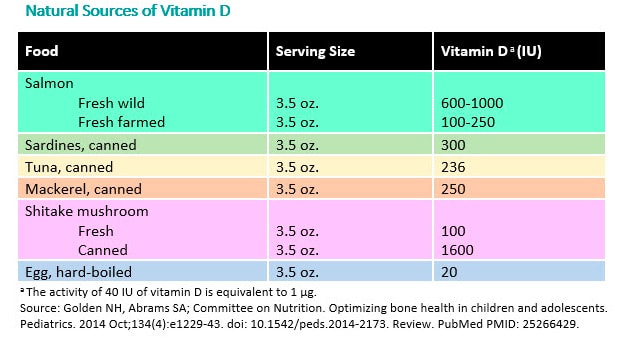|
Vitamin D regulates the amount of calcium and phosphorus in the blood and bones and is important for bone health. It’s also important in immune function and the regulation of inflammation. While it is found naturally in a few foods (like fatty fish), added to some foods (like milk), and available as a supplement, it is also made in the body through a process that’s triggered when sunlight strikes the skin. Because of the shallow angle of the sun in northern latitudes, we receive less sunlight here in Oregon to be able to make as much vitamin D naturally, especially in the months between November and April. Clothing and sunscreen use also decrease how much sunlight reaches the skin. Vitamin D is measured in international units or “IU.” Recommendations for vitamin D supplementation vary by age. Infants who take in fewer than 32 oz per day of vitamin D fortified formula should receive 400 IU of vitamin D every day. Vitamin D levels in breastmilk tend to be low, probably because most moms have low levels, even when taking prenatal vitamins. Recent research suggests that breastfeeding moms can take 6400 IU of vitamin D per day and provide enough vitamin D to their breastfed babies. If you do give your baby a vitamin D supplement, there are 2 types of infant drops available. Some have the recommended dose per drop and some have the recommended dose per milliliter or dropperful. Make sure you are using the right measurement for your baby’s drops, and if you aren’t sure, ask your child’s doctor. Kids over 12 months should get at least 400 IU of vitamin D per day, including vitamin D from any food sources. Teens should get 600 IU per day. Milk products, cereals, and some orange juice are fortified with vitamin D. Canned and wild caught fish, egg yolks, and beef liver are some natural food sources. People with low vitamin D levels may need to take high doses for a short period of time under a doctor’s supervision to return their body’s vitamin D levels to normal, but high doses of vitamin D supplements on their own are not necessarily better. Doses above 40,000 IU per day for several months can increase blood calcium levels, resulting in calcium deposits in the kidneys and arteries. High doses have also been found in studies to be associated with increased risk of some types of cancers, increased risk of cardiovascular events (like heart attacks) in adults, and increased falls and fractures in the elderly. Evidence about vitamin D increasing lifespan or helping with a variety of other medical conditions has had mixed results and still is not completely clear at this point. Most people do not benefit from having their vitamin D level checked unless they have a specific medical condition that interferes with bone health or vitamin D metabolism, such as celiac disease, weight loss surgery, chronic steroid use, or anticonvulsive use. The best thing to do is to eat lots of vitamin D rich foods, get outside, and maybe take a supplement. If you are concerned about your vitamin D level, talk to your doctor.
12/29/2020 01:05:26 pm
Thanks for explaining vitamin D supplements. I am worried about my health. I'll find some supplements. 10/30/2021 06:55:40 am
This is a great article that you shared. Comments are closed.
|
About the blogA look at some topics in breastfeeding, medicine, and kids health. Archives
December 2019
Categories |

 RSS Feed
RSS Feed